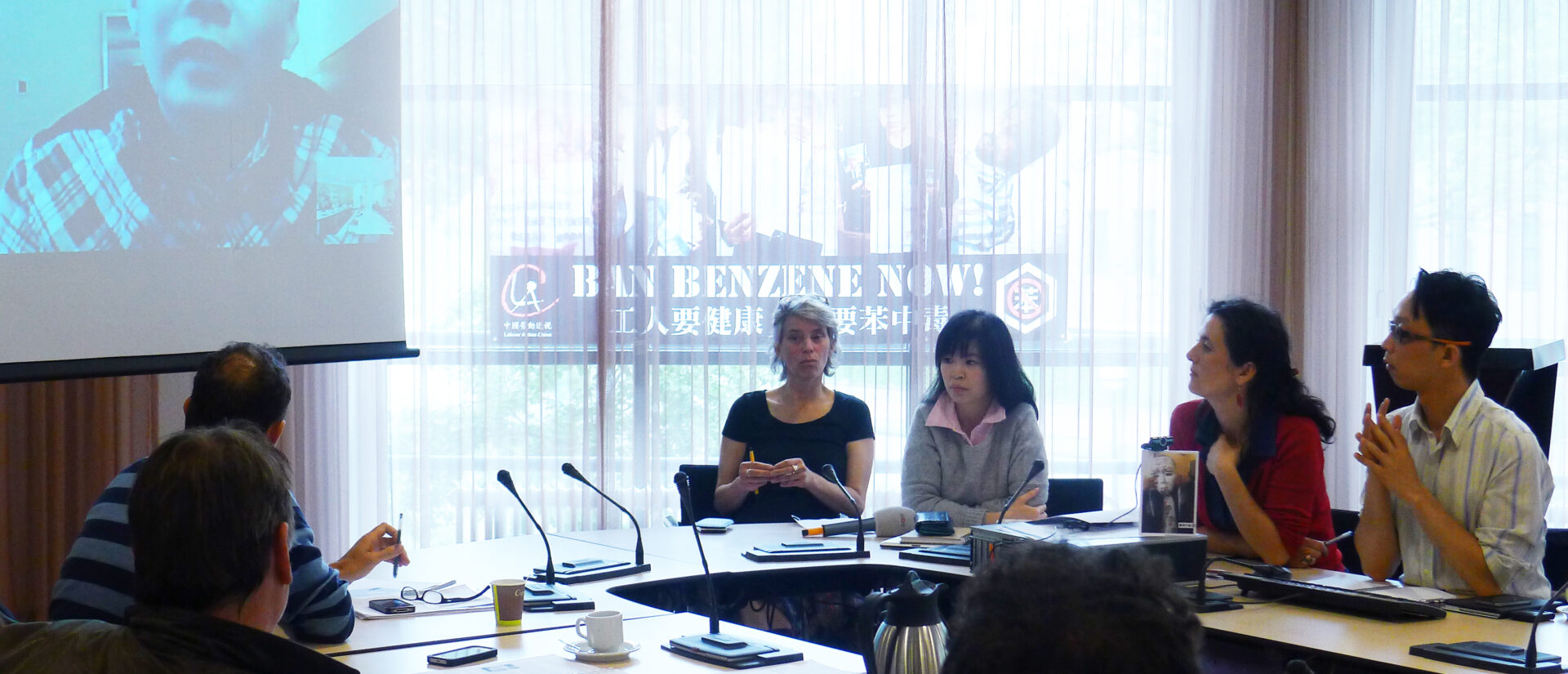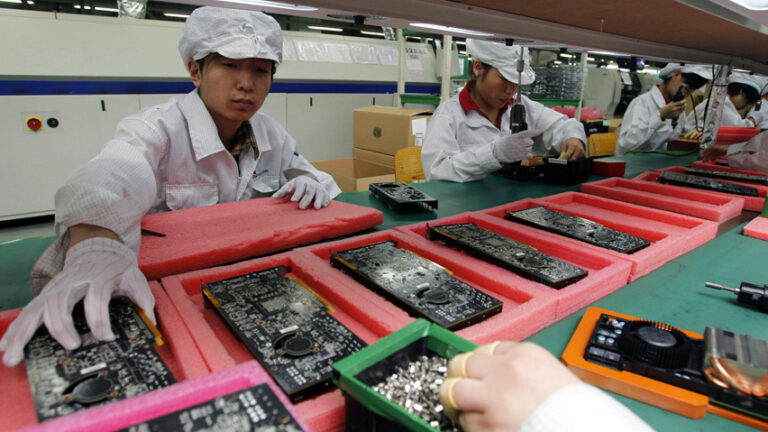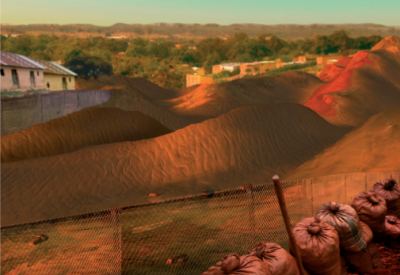
Chinese activists invited by FNV and GoodElectronics to discuss chemical poisoning
On Tuesday, 29 April, the Dutch trade union FNV Mondiaal, Labour Action China (LAC) and the GoodElectronics Network organised an expert meeting in Amsterdam on the issue of chemical poisoning in China. The discussion focused specifically on benzene, a highly carcinogenic chemical that is used in different industrial processes in the manufacturing of electronics, toys, shoes and furniture.
According to LAC, western companies have double standards: they abide by the law in Europe, but have no problem exposing their workers in China to hazardous substances, including benzene.
Participants in the meeting included Dutch trade union representatives, non-governmental organisations (NGOs) and other experts with a professional interest in manufacturing in China. Unfortunately, however, no company or government representatives responded to the invitation to take part in the meeting. The LAC delegation was supposed to include three people, but one of them was denied an exit visa by the Chinese authorities. Victim-turned-activist Yi Yeting, who suffers from leukemia after working in toxic containers, was told that he was “not qualified” to leave the country. However, he was able to join the meeting via Skype. In the three-hour session, the participants listened to his first-hand account, learned about the ‘Ban Benzene Campaign’ initiated by LAC and discussed what more could be done to address this problem.
Counting the human cost
During the meeting, two short documentaries by the American filmmaker Heather White were screened. ‘Who pays the price. The human cost of electronics’ presents the personal stories and struggles of workers who fell ill as a result of exposure to chemicals in China.
This content is available after accepting the cookies.
View on Youtube. Opens in a new window
The second video tells the story of factory worker Ming Kunpeng, who worked for ASMPT, a Shenzhen-based factory in which the Dutch electronics company ASMI holds an important minority share (40%). In 2009, Ming fell ill with leukemia and in 2013, at the age of 27, he took his own life, out of desperation with his deteriorating health and the failing medical care.
Being diagnosed with and living with leukemia has also taken its toll on Yi Yeting. It took him 22 months of fighting – the factory he worked for reportedly bribed the hospital where he was receiving care – to get the diagnosis of work-related leukemia. Now, he has had more than 28 chemotherapy sessions and is becoming drug resistant. Nevertheless, he is still helping other sick workers with legal advice, much to the displeasure of the Chinese authorities. Yi describes how he is monitored by the National Security Agency. “The incident yesterday at the border does not stand alone,” he says. “I’m constantly pressured and harassed.”
Invisible killer
Yi has personally recorded 200 different cases of workers who have fallen ill due to benzene exposure. Official statistics on benzene-induced illnesses are not available. According to Suki Chung of LAC, however, five million workers in Guangdong Province, China’s industrial hub, are exposed to chemicals every day. The problem is that most workers are not aware of the dangers. They are not aware what benzene is or the health risks they incur when working with chemicals like these. Many workers come from a rural background and have little education. When they fall ill, they do not realise their disease could be work-related. Those who can get a diagnosis are very lucky; but the rest remain invisible.
The way forward
FNV’s Policy Advisor Wim van Veelen provided the necessary legal background to the discussion at the meeting. According to the European legal framework on Occupational Health and Safety (OHS), he said, there are four key steps companies should take:
- set limit values for carcinogenic substances;
- enforce these values;
- provide workers with correct information and training; and
- provide personnel with protective equipment.
Van Veelen spoke about the alternatives to benzene. In Europe, benzene is often replaced by xylene or toluene. Although these substances are not human carcinogens they are still dangerous. Therefore, monitoring of the use of these chemicals is very important. Government authorities and the labour inspectorate have a key role to play in this respect, he argued.
Media attention
What is most urgently needed right now, LAC concluded, is the involvement of companies and media attention. LAC’s participation in the meeting organised by GoodElectronics(opens in new window) (@GoodElectronics(opens in new window) ) and FNV Mondiaal(opens in new window) (@FNVMondiaal(opens in new window) ) is part of a broader campaigning tour through Europe. The Dutch media has already picked up on some of the issues raised. On Wednesday, 16 April, the TV show EenVandaag(opens in new window) (Dutch only) broadcast an item on benzene. On Tuesday, 29 April, NOS news(opens in new window) (Dutch only) ran an item on the expert meeting, LAC and the use of chemicals used in Chinese factories. The NOS website published an article about ASM(opens in new window) taking responsibility for addressing health risks at the factories of its former subsidiary company, ASM Pacific Technology (ASMPT) including GoodElectronics opinion about the subject (Dutch only). OneWorld (opens in new window) published a blog from SOMO about the subject. The biggest Dutch daily newspaper, De Telegraaf, also carried an article.
Now it is important to get companies around the table. In spite of their reluctance to take part in the dialogue, they are key players and need to take responsibility for their actions.
Find out more in a recently released report by SOMO about the Dutch-based company ASMI, the parent company of Ming Kunpeng’s employers.
Partners
Related content
-
 Dutch microchip firm needs to address health risks at Chinese factoryPosted in category:NewsPublished on:
Dutch microchip firm needs to address health risks at Chinese factoryPosted in category:NewsPublished on: -
ASM International Published on:Posted in category:Publication

-
 Electronics Watch aims to improve labour conditions in the electronics-industryPosted in category:NewsPublished on:
Electronics Watch aims to improve labour conditions in the electronics-industryPosted in category:NewsPublished on: -
 Important improvements at chinese electronic factories but pressing issues remainPosted in category:NewsPublished on:
Important improvements at chinese electronic factories but pressing issues remainPosted in category:NewsPublished on: -
 Local voices remain unheard by mining and electronic companiesPosted in category:NewsPublished on:
Local voices remain unheard by mining and electronic companiesPosted in category:NewsPublished on: -


